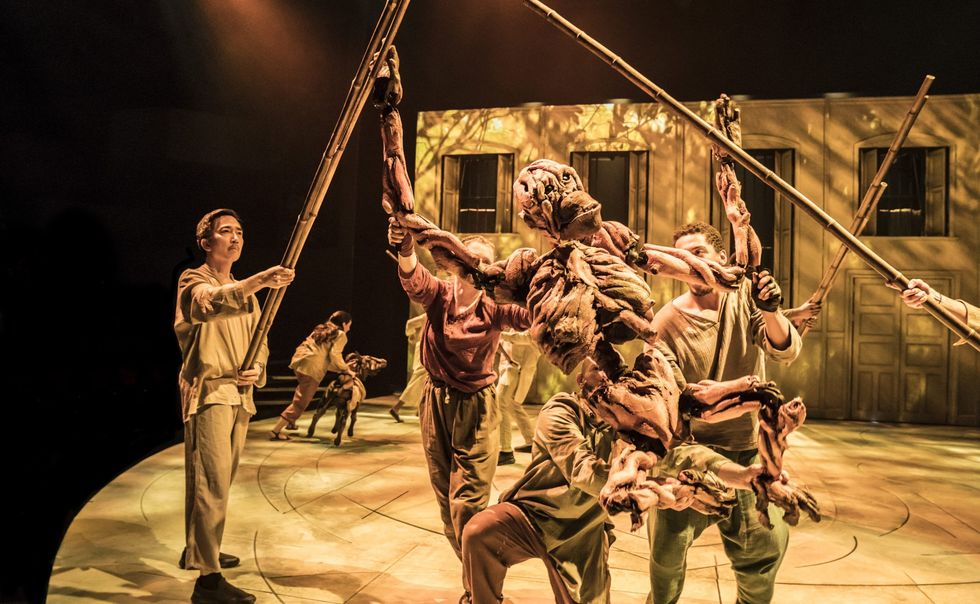Actors reveal their personal journeys ahead of award-winning story's west end opening
THREE members of the cast of Life of Pi have spoken of their “satisfaction” with their roles in the stage version of Yann Martell’s Booker Prize-winning novel, which opens at Wyndham’s Theatre in London on November 15.
The three actors – Hiran Abeysekera, Mina Anwar and Raj Ghatak – also discussed their personal journeys in a changing Britain, mirroring in some ways Pi Patel’s 227-day trip across stormy oceans in a small boat with a Royal Bengal tiger, named Richard Parker (“because of a clerical error”), for company.
Abeysekera takes on the lead role of 16-year-old Pi, which he also did when the production was first staged at the Sheffield Crucible in July 2019. The pandemic delayed the transfer to the West End by two years, which also means many of the puppeteers and half the cast are new, “so it feels like a fresh play”.
He was born in Kotte near Colombo when Sri Lanka was in the middle of a civil war. At school one day he remembers hearing a loud boom and saw crows scatter from a tree. The children “knew it was a bomb”.
His father ran a garage, while his mother taught English at Colombo University. At 15, he played a parrot in a local production of Goldilocks and the Three Bears.
When he was 19, he was talent spotted by Willi Richards, a visiting British theatre director, who cast him as Romeo in a trilingual version of Romeo and Juliet.

Thanks to encouragement from Richards, Abeysekera ended up with a scholarship to RADA [Royal Academy of Dramatic Art] in London in 2008 when he was 23 and found his life “transformed”.
He has now settled in England and lives in Deptford with 12 other artists in a historic property, The Master Shipwright’s House, owned by Richards.
Abeysekera has no hesitation in acknowledging: “There’s a lot of magic in my life”.
Meanwhile, Anwar, who has been cast as Pi’s mother and takes on various other roles in the production, was born in a Blackburn hospital, grew up in Accrington in Lancashire, and still thinks of herself as “a girl from a working-class northern town”.
She grew up with four sisters and two brothers and parents who arrived in Britain in 1963 from Jhelum near Rawalpindi.
She was 17 when she came to London for the first time to attend drama school, and in March this year, celebrated 30 years in the arts. She had always been confident enough of her talents to push for nonstereotypical roles.
Anwar has worked with the likes of Glenda Jackson, Rowan Atkinson (many people will remember her as Police Constable Maggie Habib in the BBC TV comedy, The Thin Blue Line and Dr Sandra Malik in The Bill ), Ben Elton, Mike Gatiss and Stephen Fry – “people I’ve watched for years”.

Although her father worked in a number of industrial plants and her mother was a home-maker, the children were taken to see Satyajit Ray’s films and also such Bollywood classics as Awaara, Mughal-e-Azam and Pakeezah. When she was 40, Anwar did a BSc degree in psychology through the Open University.
She finds her role in Life of Pi “very satisfying” because it has enabled her to use her many skills, including acting, singing, dancing and puppetry.
“I play Pi’s mother, but this is an ensemble piece and we all play quite a lot of things,” she points out. “We also play Pi’s environment – so we play the debris on the water and the fish.”
Ghatak plays Mamaji, a community uncle figure “who teaches Pi to swim and therefore (indirectly) saves his life”, as well as Panditji, a Hindu priest.
He read Life of Pi when it first came out in 2001, and got his copy signed by Martell when he flew over from Canada to see the play in Sheffield.
Ghatak was born into a Bengali family, where his maternal grandfather and his mother and his father – a chemist and a doctor, respectively – were all involved in the arts. He attended the City of London School and then boarded at Epsom College, a public school. “Then I went to the Central School of Speech and Drama and Queen Mary University.”
When he did go into acting, he realised there was “a very palpable glass ceiling in place. And while I was working continuously, the types of opportunities that I was being given or allowed to have were very different to my white counterparts.”
Ghatak says Andrew Lloyd Webber’s Bombay Dreams, in which he had a central role in 2002, was a “game changer”, as he is sure Life of Pi will be.

“Certainly, within the Asian diaspora, we understood the significance of Bombay Dreams. Actually, people of colour, per se, understood its significance.
“Since then, I have worked with actors or people have got in touch with me, saying, ‘I saw that show, or my family took me to see that show. And because of you, my parents allowed me to be an actor.’ It’s such a humbling moment.”
A film adaptation of Life of Pi, directed by Ang Lee in 2012, won four Oscars. The stage version, written by Lolita Chakrabarti, won rave reviews after it opened in Sheffield. Max Webster is the director and Simon Friend the producer, and the puppet and movement direction is by Finn Caldwell.
The cast also includes Sagar Arya; Nuwan Hugh Perera; Syreeta Kumar; Deeivya Meir; and Habib Nasib Nader.
In Life of Pi, there are two interpretations of what the boy experienced. In one, the tiger kills the hyena which had eaten the zebra and the orangutan. All the animals had sought refuge on the boat after the ship carrying the zoo run by Pi’s parents in Sri Lanka had sunk in a storm on its voyage to Canada.
In another, instead of the animals, Pi was adrift in the lifeboat with the ship’s cook, a Taiwanese sailor with a broken leg, and his own mother. The cook amputates the sailor’s leg for use as fishing bait, then kills the sailor as well as Pi’s mother for food, and soon he is killed by Pi, who dines on him.
Abeysekera, Anwar and Ghatak all incline to the first version with the animals, and that Pi and the tiger realised they needed each other to survive.
“As Hiran, I like to believe that there are things we can’t really explain,” said Abeysekera.
“My way of thinking is that the world is full of possibilities. I would like to think there are gods, there is magic, and we are able to open our minds enough to be able to tap into them.
“So, the story of animals – I relate to that. The more the book and the story are with me and the more I work around it, the more I am sure that the story about animals is the true one.”
Incidentally, former US president Barack Obama wrote a letter to Martel in 2010, describing Life of Pi as “an elegant proof of God, and the power of storytelling”.
Life of Pi is at the Wyndham’s Theatre from November 15.



















